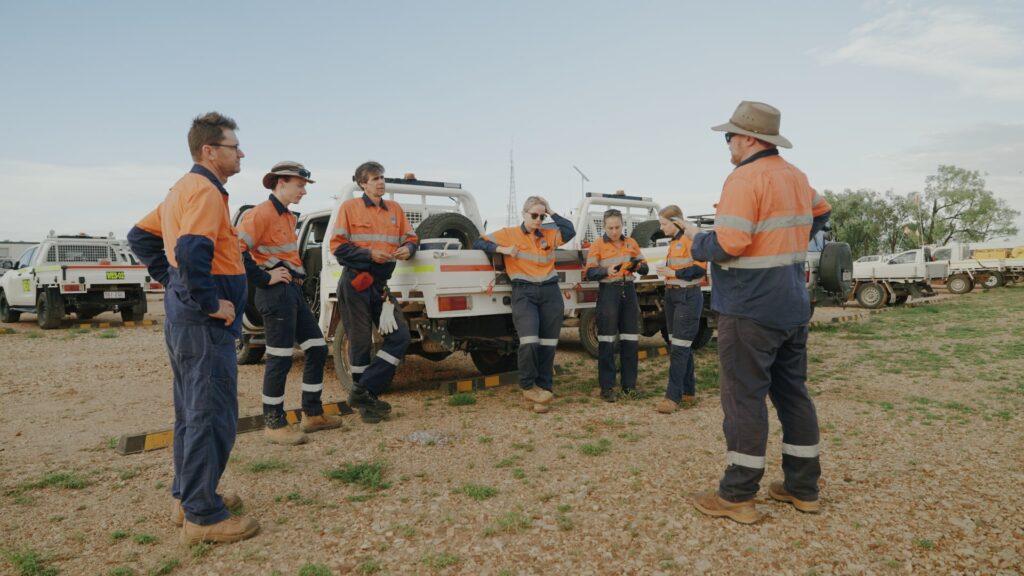By Jacqui Gamack
Since my first job in the medical field, safety has always been a critical focus. First and foremost, lives matter. So whichever point I’ve been at in my career, watching out for other people and making sure you leave your workspace clean, clear and safe has been critical. When you add external factors, when we’re out in the field, field safety issues are multiplied by the exposure of people to the unknown environments in which we operate. There’s simply so much we can’t control in the field.
Working through and aligning to the process improves safety outcomes
At E2M, we go through a very clear process and procedure before we leave for site, qualifying risks and assumptions and agreeing to mitigation strategies with the leadership team. We write our safety documents before we go, covering the issues you’d expect including the weather, driving and site risks that could arise.
When we’re on site we evaluate risks all of the time. If we see smoke, or we know the fire danger is high, then we check the RFS website or check in with a field-based client contact. Then there is general day to day things like driving behaviours – which we always need to be mindful of.
The learnings from near misses
There are always examples we can learn from as a team and we share them freely. One of the most confronting near misses for me was being out on a site for an Oil & Gas project. I had a graduate with me.
We were out on a site traversing rough terrain around some pipelines, going through gullies and water courses. And I know we have to be careful, and have been fully safety trained as a leader, so I cross checked everything and followed due process, to the point I took over the driving because of my experience in rough terrain, knowing that was a good mitigation strategy.
We checked each creek crossing prior to driving it, but as I crossed a creek, one of my wheels slipped off the edge of a rock. The vehicle ended up balancing on three wheels. We were stuck and had to call the client to come and get us out of the watercourse as we couldn’t safely recover the vehicle ourselves following our documented processes
A good safety outcome isn’t always in your control
Even though I had done all of the checks and balances, we still had an issue. Fortunately part of being part of a great team with clients that have safety as a key value too, meant that we were easy to locate, and the client drove straight out to us to assist with more specialist equipment. The feedback from the client was that we’d followed our agreed safety management plans perfectly.
Understanding how others deal with stress is important too – my team member was looking for his lunch and I was concerned about the car!
When we returned to the Flock, we did a safety share to share the importance of being vigilant and also knowing that sometimes things happen outside of your control.
Ultimately managing and mitigating risk by following procedure will deliver a better outcome and can save lives.
Your voice is the best safety control you have
We have to watch out for heat stress all the time. We do a lot of walking. We make sure we’re always hydrated and standing in the shade as much as possible.
When you’re the team lead, you have to read everyone all of the time. I’m always mindful of sounding like a broken record, because I’m always asking how the team are feeling. Sometimes it gets to 3pm and we’ve been walking all day, and we’ll call time, because we’re cognisant of the fact that others may not speak up as freely as we do. And if I’m tired, they’ll be tired too.
We’ve always done town halls and safety chats, so we all know. If you need to speak up, or you don’t feel good, and you’re being pushed into a state of discomfort, it’s time to stop and speak up. And if you see your team members looking like they’re slowing down, it’s on you to speak up for them.
If one person says a situation isn’t safe, we don’t proceed, because that’s the warning shot and we always take heed. Having a team mentality is everything.
Knowing when you need your space
After 12 days together, we might get a bit snappy, because we’re tired. Everyone still wants to do the best job they can but being in close proximity comes with its own set of wellbeing challenges. Sometimes we’ll recognise it’s time to spend a little time apart to re-energise. It’s absolutely critical to recognise when you, and others need space.
The importance of town halls and safety shares
We get the team together and share our stories to improve outcomes and learnings for everyone. Sometimes it’s prompted by a situation, which could be a landholder interaction or getting an infringement for driving over the speed limits or braking too suddenly. So we sit down with everyone and remind them of the importance of our Flock returning safely to keep it front of mind.
Working with clients who align with your safety values
All of our clients put safety as their number one priority too – so we’re always aligned. They have all of the technology, inductions and monitoring devices to ensure their people and contractors are always safe.
We did a client project which was extremely remote. For avid hikers and campers, it’s enjoyable. For me, 12 days camping without facilities takes safety to a whole new level. The team put an enormous amount of focus on ensuring that every aspect of safety was covered for the team.
